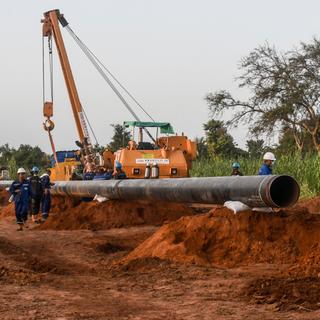


Niger's coup only briefly halted giant oil pipeline project
FeatureThe July 26 coup d'état, which toppled President Mohamed Bazoum, hit the country just before its oil pipeline was due to come on stream. After a stalemate, exports of black gold should finally begin.
It's a long pipe that winds its way across the Sahara to the Atlantic Ocean. The pipeline, which stretches for almost 2,000 kilometers from the Agadem fields to the port of Sèmè-Podji in Benin, is the cornerstone of Niger's oil project. Until now, the Sahelian state, one of the poorest in the world, has been a very modest producer of black gold, used locally or sold to its neighbors. With this pipeline, Niamey was poised to join the club of African crude oil exporters. After five years of work and an investment of $2.3 billion, the project was nearing completion, with its inauguration scheduled for October. Then, suddenly, came the coup d'état.
On the evening of July 26, a handful of soldiers, looking serious in their camouflage uniforms, appeared on television screens to announce the overthrow of President Mohamed Bazoum, who was being held in his residence. Suspension of institutions, curfew, border closures. The Economic Community of West African States (ECOWAS) quickly imposed heavy financial and trade sanctions and threatened military intervention with unprecedented fervor. In response, the junta barricaded itself in. At the border with Benin, perceived as particularly hostile, the military placed heavy containers to block the bridge spanning the yellowish waters of the Niger River, the only road crossing between the two countries.
As far as the pipeline was concerned, everything came to a halt. The last few metric tons of equipment were blocked on the Beninese side. The Chinese constructor CNPC (also an operator of the Agadem fields) held its breath – and its nerves – while the junta considered the possibility of building a new pipeline, passing through a "friendly" country such as Chad or Algeria, as the website Africa Intelligence reported in August. Will Niger produce oil, and when? Many observers are, for now at least, skeptical.
'The floodgates are open'
There was a new twist at the beginning of November, barely three months after the coup. With great fanfare, the junta organized an inauguration ceremony at the starting point of the pipeline in the desert southeast of Agadem, where oil reserves are estimated at two billion barrels. In front of a crowd of officials sheltered from the scorching sun, a heavy red carpet was rolled out onto the sandy ground. Nigerien and Chinese flags fluttered in the wind. Wearing a long blue gandoura, sunglasses and a white turban, Prime Minister Ali Mahamane Lamine Zeine was "warmly welcomed" by the local head of the CNPC, Zhou Zuo Kung, before writing a few words in the guest book – chosen in bright red for the occasion. A ceremony of "great significance for Niger," marking "the kick-off of production," commented state television emphatically.
You have 75% of this article left to read. The rest is for subscribers only.
